

In order to minimise and cope with stress, one must be able to identify stress and know how it affects the body. What is Stress. The Basics of Stress. Stress is a situation that triggers a particular biological response.
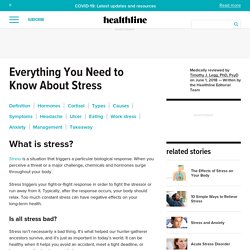
When you perceive a threat or a major challenge, chemicals and hormones surge throughout your body. Stress triggers your fight-or-flight response in order to fight the stressor or run away from it. Different type of stress. The Types of Stress. Understanding stress can help you know more quickly when you need help.
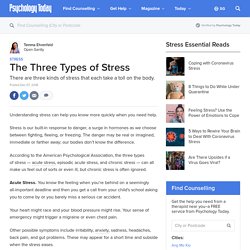
Stress is our built-in response to danger, a surge in hormones as we choose between fighting, fleeing, or freezing. The danger may be real or imagined, immediate or farther away; our bodies don’t know the difference. A whopping 92% of working Singaporeans are stressed – and women are prioritising families over themselves, study finds, Business Insider - Business Insider Singapore. Pexels If you’re feeling stressed at work, you’re not alone.
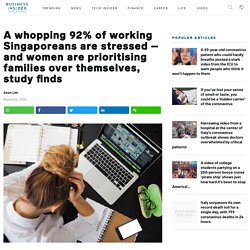
A vast majority of working Singaporeans are under stress, and women in particular feel that it’s less manageable, a survey has found. In the 2019 Cigna 360 Well-Being Survey, a whopping 92 per cent of working Singaporeans report feeling stressed, higher than the global average of 84 per cent. Of this, 13 per cent say their stress is unmanageable, which is on par with the global average, according to the study which surveyed a total of 13,200 online interviews in 23 markets, including 502 residents in Singapore. And stress doesn’t go undetected in the workplace. Read also: 6 in 10 Singaporeans admit that they don’t leave work on time just to ‘show face’ Suffering burnout at work? Understand why it happens. SINGAPORE — Miss Wee Sihui is only 22, but the former retail assistant, who started working full-time early this year, is suffering burnout from work and its accompanying symptoms of feeling constant exhaustion, negativity, dread and pessimism.

She used to work in a popular confectionery store and when there was a manpower crunch, she spent around 13 hours on her feet from 9.30am to around 10.30pm daily, juggling responsibilities meant for at least two employees. But it wasn’t just the physically punishing work routine that made her quit her job. The mental stress, fuelled by a lack of support at work, led to anxiety attacks. “I sometimes felt like I could not breathe. I had trouble handling the stress of multi-tasking tasks while looking after the store alone,” she said.
“I didn’t tell my managers as I didn’t want to seem like a ‘complain queen’. Coping one day and crying the next: Work-related burnout is real. SINGAPORE: One day at work, Ms Jamuna Raj was striking off “to-dos” from a neat hand-written list, thinking she had a lid on all her tasks at work.
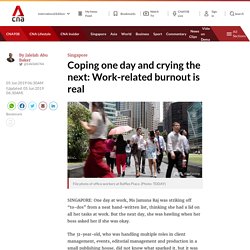
But the next day, she was bawling when her boss asked her if she was okay. The 31-year-old, who was handling multiple roles in client management, events, editorial management and production in a small publishing house, did not know what sparked it, but it was the start of her journey towards realising that she was experiencing burnout. “I was striking the to-dos off, but for every one that I did, there were five more. Still, because I was striking things out, I thought I could handle it,” she told CNA. At the time, she had multiple deadlines looming ahead of her. Her boss had checked on her because she had changed and her colleagues noticed it, said Ms Jamuna, a Singaporean who lives in Melbourne. “As soon as he (her boss) asked me that, I started bawling. READ: Commentary: What’s behind burnout? “I went back, and I saw my emails, I cried. Causes of Stress in workplace. It's no secret that everyone is stressed out.
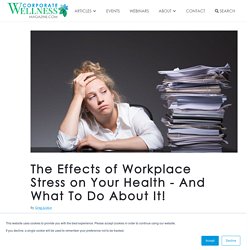
We've all had those days where we feel flustered, irritated, and anxious. We've all had those nights where it's too difficult to fall asleep - that all you can do is worry about what you have on your plate. Common Stressors in the workplace. Being in the Sandwich Generation. Are you part of the sandwich generation?
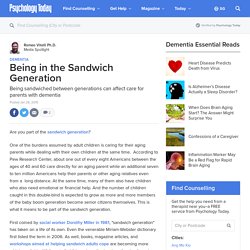
One of the burdens assumed by adult children is caring for their aging parents while dealing with their own children at the same time. According to Pew Research Center, about one out of every eight Americans between the ages of 40 and 60 care directly for an aging parent while an additional seven to ten million Americans help their parents or other aging relatives even from a long distance.
At the same time, many of them also have children who also need emotional or financial help. And the number of children caught in this double-bind is expected to grow as more and more members of the baby boom generation become senior citizens themselves. This is what it means to be part of the sandwich generation. article continues after advertisement First coined by social worker Dorothy Miller in 1981, "sandwich generation" has taken on a life of its own.
Symptoms of work related stress. Symptoms of work-related stress Work-related stress is a growing problem around the world that affects not only the health and well-being of employees, but also the productivity of organisations.
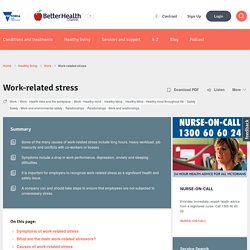
Work-related stress arises where work demands of various types and combinations exceed the person’s capacity and capability to cope. The harmful effects of stress at work. During college, students spend about four years stressing over assignments, deadlines and adapting to new environments.
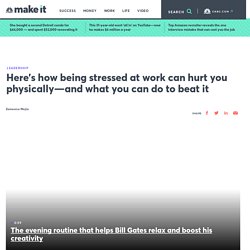
As they prepare to enter the workforce, the pressure to meet academic expectations gets replaced with high career expectations and the stress continues. Although a constant state of stress has become the new norm for many working adults, the physical and mental toll is crippling their chances at success, esteemed workplace and happiness experts Annie McKee and Emma Seppälä argue in their research. “Most of us work more than eight hours a day,” McKee writes in her latest book “How To Be Happy At Work” based on decades of working with Fortune 500 companies.
What stress does to the body. Stress Management Strategies. It may seem that there’s nothing you can do about your stress level.
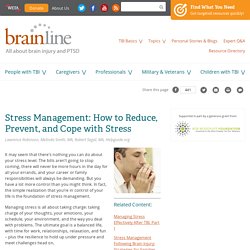
The bills aren’t going to stop coming, there will never be more hours in the day for all your errands, and your career or family responsibilities will always be demanding. But you have a lot more control than you might think. Stress Management. While it may seem like there’s nothing you can do about stress at work and home, there are steps you can take to relieve the pressure and regain control. Sandwich generation: 9 tips for managing your unique stress. The "sandwich generation" is made up of people who are simultaneously taking care of their children and helping their aging parents. The Power of Music To Reduce Stress. The soothing power of music is well-established. It has a unique link to our emotions, so can be an extremely effective stress management tool. Listening to music can have a tremendously relaxing effect on our minds and bodies, especially slow, quiet classical music. This type of music can have a beneficial effect on our physiological functions, slowing the pulse and heart rate, lowering blood pressure, and decreasing the levels of stress hormones.
Unhealthy ways of coping. When it comes to responding to stress, the possibilities are endless. So how do we know if our mechanism for coping is doing us more harm than good? You may feel like you can't function without coffee or you find yourself hankering for a smoke as anxiety sets in. You may be dealing with stress in ways that could have long-term negative effects on your health. Read on to find out the top 10 ways people deal with stress in unhealthy ways and tips on how to cope productively. 01. An occasional coffee is harmless, but remember that caffeine has lasting effects on the body.
Fix: Pay attention to coffee's effects on your body and limit your intake. 02. It's tempting to use stress as an excuse to treat ourselves with retail therapy. Fix: If you can reduce your stress level, it’s likely that you’ll also reduce the likelihood of spending frivolously. 03. Negative Coping to Stress. If you are stressed out, experience symptoms of trauma or have PTSD, then you may try to deal with your problems through avoidance and other negative ways of coping that are detrimental and self-defeating behaviors that make your mental and physical health worse. This is called negative coping. To cope is to make a specific alteration physically, emotionally, or mentally so that you can manage or adapt to something that is causing you distress.
Negative coping does not allow you to learn healthy ways of coping with stress, trauma, and PTSD. Negative Coping results in Negative Patterns and Negative Outcomes. Summary. How stress affects your body. How to make stress your friend.